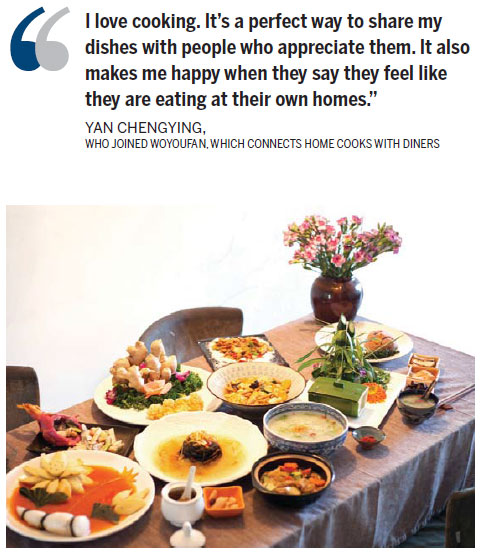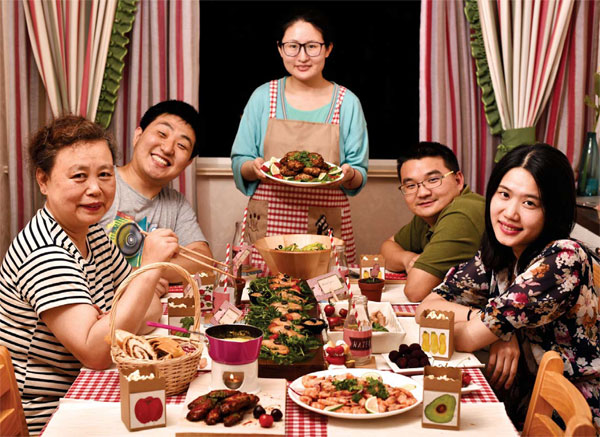Guess who's coming to dinner?

Online peer-to-peer dining platform connects home cooks with strangers for friendship and food
Yan Chengying rose at 4 am on a Saturday in July and kept herself busy through the day preparing a 14-dish dinner - not for her family or friends, but for eight strangers who had already paid for the food.
When all the diners - also previously unknown to each other - arrived at 6 pm, the meal started with a brief self-introduction by each. Then they enjoyed the food, while discussing topics ranging from how to cook dishes served by Yan to where the best diving spots are. Yan, 61, joined the conversation with her daughter after finishing up in the kitchen.
| Diners, previously unknown to each other, gather for a home-cooked meal in Shanghai arranged through the Youfanapp website. Photos Provided to China Daily |

Several weeks ago, Yan joined an online platform that serves home-cooked meals, and offered to host a Huaiyang-style cuisine once a week for strangers at her house in Beijing. She charges 168 yuan ($27) per person for the array of dishes featuring local cooking styles from east China's Jiangsu province.
"I love cooking. It's a perfect way to share my dishes with people who appreciate them. It also makes me happy when they say they feel like they are eating at their own homes," says Yan, who was born in Nanjing, the capital city of Jiangsu, and lives with her daughter in Beijing.
Yan's daughter Yan Weiqi, an architect, encouraged her mother to go ahead with the plan as it was a good way for her family and their guests, from different walks of life, to make friends.
"At one dinner a week, I get to know eight new people; in a month, 32; in a year, several hundred. That's an amazing speed for expanding my circle of friends," says Yan Weiqi.
Woyoufan, the online platform her mother joined, was established in January. There were few hosts then, but now more than 100 people have registered, says the founder Feng Zheng.
Every week through his website Youfanapp, about 60 hosts in Beijing and Shanghai provide meals at their homes, from traditional Chinese cuisine to Western-style brunch, cozy afternoon tea and desserts.
As of the end of July, more than 3,000 people had bought meals and the website had attracted about 150,000 fans, according to Feng.
Besides Woyoufan, many startups in China have followed the social dining trend popular in the West since 2013. Peer-to-peer dining is seen as a new kind of "sharing economy" fostered by online companies like Airbnb and Uber. Many see a greater market in China, considering the nation's food culture.
"Chinese people are born with a strong love of cooking and sharing food with others. It's rooted deep in our blood. Just look at the number of Chinese restaurants around the world," says Feng, 28, who graduated from Yale University and returned to China in 2014.
In order to organize a more comfortable setting, a Shanghai-based host has rented another house, a period structure in a former concession area, for the once-a-week meal. A Beijing-based host has moved into a downtown apartment to make it more convenient for diners.
Many of the hosts, says Feng, first used the site as diners.
For Jiang Pingping, a housewife who quit her job this year, taking part in this kind of social dining seems to be a regular activity. Every week, she tries a new meal, meets different people and makes friends. She says she loves to find new dishes at hosts' houses - and to learn to cook them for her children at home.
Making friends while eating together is a good way for the Chinese, who are often shy in public, to break the ice, says Jiang.
Feng says a home-cooked dinner creates a comfortable environment for many Chinese, who might otherwise feel embarrassed to talk to someone they meet for the first time. The food is a way to gather people together and provides a good topic for conversation, too.
A few customers even start dating people they meet at such dinners, adds Feng.
To organize a comfortable and interesting dinner, some hosts play musical instruments for their guests, while others offer cards and games.
As a new host, He Manxi cooks hot and spicy crayfish, a special cuisine from her hometown in central China's Hunan province. After dinner, her daughter plays the piano for diners and her son-in-law starts a conversation with their young guests, mostly in their 20s.
He says although she has to prepare the dinner one day earlier, spending many hours in the kitchen, she feels satisfied when she sees her guests relax and laugh at the table and hears them praise her food - usually native cuisines for people working in Beijing.
"Most Chinese don't know about this kind of dining. Once they learn of it, they will be passionate about it," says Feng. He believes it represents a new kind of lifestyle for people, just like going to watch a movie or dining out at restaurants. Later this year, his team will recruit hosts in many new cities, including Shenzhen, Hangzhou and Guangzhou.
dengzhangyu@chinadaily.com.cn
(China Daily European Weekly 08/14/2015 page26)
Today's Top News
- Japan tempting fate if it interferes in the situation of Taiwan Strait
- Stable trade ties benefit China, US
- Experts advocate increasing scope of BRI to include soft power sectors
- New engine powers cargo drone expansion
- China to boost green industry cooperation
- Manufacturing PMI rises in November































